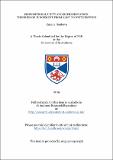Propositional unity and representation : theories of judgement from Kant to Wittgenstein
View/
Date
24/06/2019Author
Supervisor
Metadata
Show full item recordAltmetrics Handle Statistics
Altmetrics DOI Statistics
Abstract
The aim of the thesis is to provide a fresh look at the beginning of the British analytic
tradition, represented by early G. E. Moore and B. Russell and later by a young L. Wittgenstein,
and emphasize especially the way in which this tradition was influenced by Kant’s
transcendental-idealistic epistemology in general, and the notion of judgment in particular. In
doing so, I open my account by focusing on how Moore’s ground-breaking notion of a
“proposition” as a mentally-independent entity emerged out of his critical reflections on Kant’s
account of judgment as a mental activity of bringing representations under the unity of
transcendental apperception. Subsequently, I present Russell as adopting this notion of a
proposition, providing a thoroughgoing analysis of it and, after discovering its philosophical
shortcomings, finally abandoning it in favour of his multiple relation theory of judgment. Based
on the detailed description of the nature and changes within Russell’s multiple relation theory,
I then attempt to disentangle Wittgenstein’s famous, oft discussed argument against it and
introduce the notion of a “proposition” from the Tractatus as Wittgenstein’s attempt at the more
appropriate theory of judgment. Eventually, I illuminate how the approaches to judgement and
proposition under consideration may all be considered particular responses to Kant’s
transcendental-idealistic epistemology, something I do by paying attention in particular to the
notions of unity of single propositions and judgments as opposed to the overall unity within the
body of all propositions or judgments.
Type
Thesis, PhD Doctor of Philosophy
Collections
Items in the St Andrews Research Repository are protected by copyright, with all rights reserved, unless otherwise indicated.

